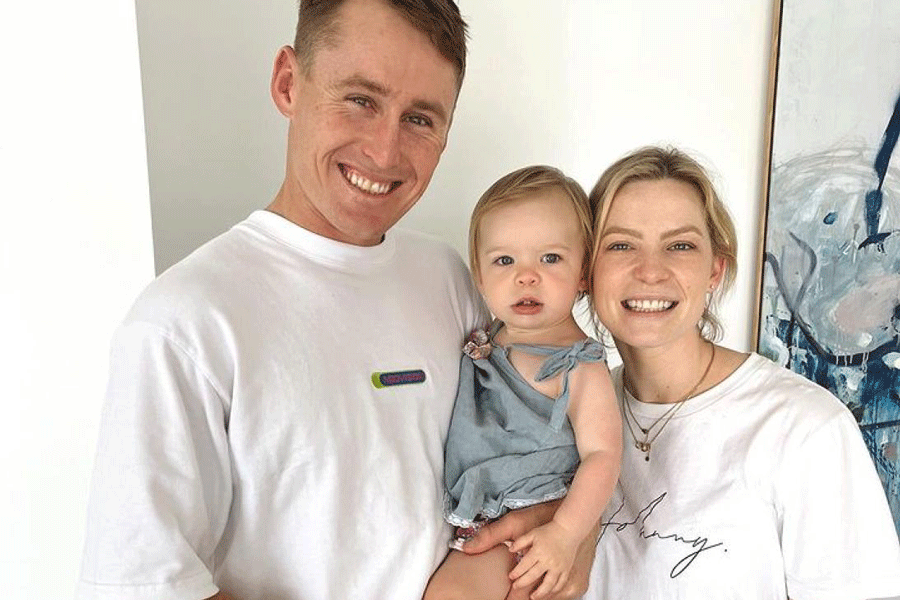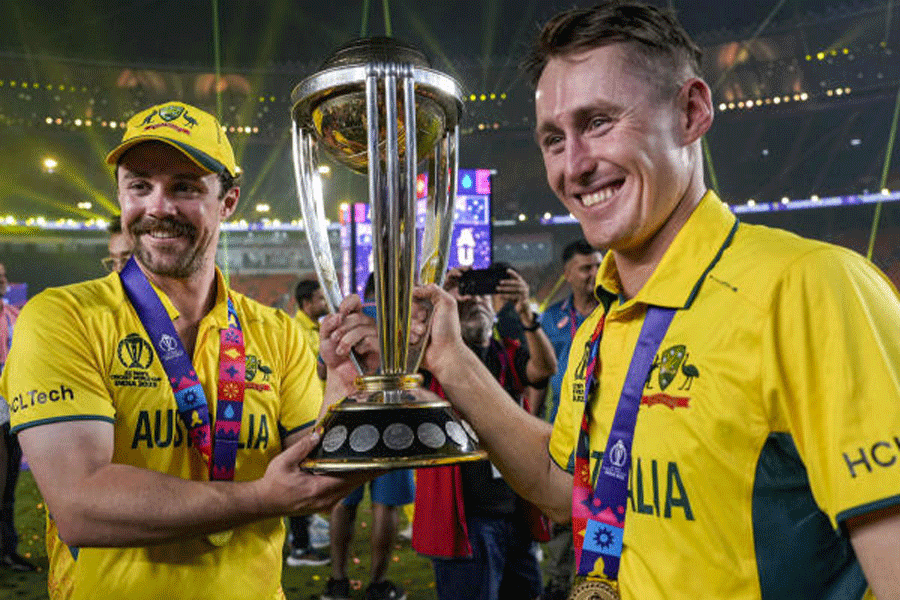Calcutta: Marnus Labuschagne has been the unsung hero of Australia’s successful World Cup campaign. His unbeaten 58 in the final in Ahmedabad and 192-run partnership with Travis Head went a long way in achieving their mission.
Labuschagne, 29, spoke to The Telegraph from Brisbane on Friday morning while enjoying a break from cricket with his family.
Excerpts:
Q: Congratulations, Marnus. Has the victory settled in?
A: I don’t think the achievement of winning in India, winning a World Cup, has really settled in. Moving on, the T20s have started... I think it’ll take a bit to sort of really soak in what we actually achieved as a team.
Q: Your voice was choking with emotion in the mixed zone after the final. What does it mean to be a world champion?
A: Yeah, I think it was just a recognition of the achievement not only from the team and what we achieved but also from my own personal experience... from not being in the squad to coming in during the South Africa tour a month earlier. I wasn’t even in the picture at the start... That’s why I was a bit emotional. Just because of the achievement of what actually unfolded in that period of time.
Q: Pat Cummins’ decision to put India in to bat in the final was a bold one. Was it something you guys got together and discussed?
A: No... There was certainly talk around the team about what we should do in the final. I mean usually Pat loses the toss anyway, so we were just banking on India doing what they wanted. So it was a bit of a surprise when he actually won the toss... I think it was a great move to put India in. In a World Cup, we knew the wicket would be tougher to play on during the day and if we could navigate the night session; there would be a bit of swing and seam.
We knew the wicket was going to get better and it did. I mean, although it looked a bit bleak there for a bit, being 47 for three and you had Bumrah and Shami with their tails up. I think once we weathered that storm, you could see the wicket actually did get a little bit better for batting.
Q: Your innings was equally important in the final along with Head. How was it batting in the middle at a stadium full of supporters who were always trying to pull you down?
A: When you’re out there, you sort of take over yourself. Your natural instincts, all your training and everything that you’re prepared for just take over. And the scenario was probably made for me in the sense that I could use my sort of Test match skills and navigate that scenario with no real run-rate pressure, especially with Travis at the other end and a low target. It was just a matter of me and Travis building a partnership and trying to put India under pressure.
And in the final, it wasn’t necessarily with runs, but it was with a lack of wickets... And I think we did that.
And then once we got closer, the total got down, they started searching for wickets, and then that’s when the scoreboard really opened up towards the back end when we needed about under 100.

Marnus Labuschagne back home with wife Rebekah and daughter Hallie Grace. Instagram
Q: How was it watching Head from the non-striker’s end?
A: Like I said, watching Travis bat at the other end is a delight, he’s such a beautiful striker of the ball. He takes the game on. And it was just a matter of both of us playing our own game and according to the scenario in front of us. And he takes the game on and I absorb the pressure. And it was almost a match made in heaven for that scenario.
Q: How did you plan to tackle the Indian spinners on the dry wicket?
A: It came down to our bowlers who restricted India to 240. It took the pressure off the batters. So you probably got a few more scoring options with no need to take risks. That's what changed the scenario at the end of the day. The prospect of a 320 chase on that wicket would have been different with more risks involved against the spinners.
Q: Was there panic in the camp once three wickets went down quickly?
A: I’m sure there was a bit of nerves floating about the next batters in sort of waiting to bat and being on the edge. But my job in that scenario was to come out and calm the situation down, just absorb some pressure, sort of just keep soaking up some pressure and start building a partnership. And hopefully, that calmed a bit of the nerves in the changing room to sort of say that, ‘we can do this, we can chase this target’.
Q: The pitch was a subject of much debate. Were you guys worried about the pitch on the eve of the final?
A: No, we weren’t worried about the pitch at all. We knew that whatever pitch we were dealt with, both teams were going to have to bat on it.
And regardless, we needed to beat India at their home, in their conditions to win the final. And that’s what makes it even sweeter... we beat arguably one of the best one-day teams ever to play at home in the final on a wicket which was meant to be the perfect wicket for the Indian bowlers... I think that part makes it very exciting.
Q: What is it that makes this team special in big tournaments like the WTC final or the World Cup?
A: I think it’s just about the tournament. You’ve just seen so many of our players are big-game players. They found a way. They always find a way. And over a tournament period, everyone stepped up at different times to put the team in the right position, and everyone took it upon themselves at different stages in the tournament. That's what makes it special, that we’ve got big game players... when the pressure goes up, they just step up and take it to the next level.
Q: What was the discussion around the group when you lost the first two matches and almost lost to Afghanistan?
A: It’s just understanding... ‘We know what we need to do. We haven’t played our best cricket’... We knew once we started playing our best cricket, we would be able to put teams under pressure. And it was really securing our first win against Sri Lanka that got the ball rolling. The boys sort of took a breath, and then we started really playing well.
Q: Has this team made its name among the best sides of Australian cricket?
A: Look, I can’t compare to some of the other teams that played, but I know how tight this tournament was with 10 teams. I think there’s probably not been a World Cup where there’s been so many close games with every team in the competition. I don’t think there’s a World Cup where every team’s won two or
more games, so it shows you the tightness.
The conditions were so different at times in the game, which made it tough. You needed to be versatile. The ball swung at night, it spun during the day. There were so many different things to navigate, and what we achieved as a team certainly puts it down as, in my opinion, one of the great World Cup victories.
Q: And for you personally, what does it mean? What’s the next level for you?
A: I’m not sure. I don’t think I’ve reached that yet. But there are not many things that can top winning a World Cup in India.
I mean, maybe winning an away Ashes and winning an away tour of India are probably the only things that can really get close to that sort of mark. But in terms of what we achieved to win a World Cup... you need to play cricket, really good cricket for 10 weeks.











